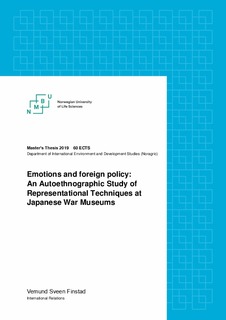| dc.contributor.advisor | Stuvøy, Kirsti | |
| dc.contributor.advisor | Glaab, Katharina | |
| dc.contributor.author | Finstad, Vemund Sveen | |
| dc.coverage.spatial | Japan | nb_NO |
| dc.date.accessioned | 2019-10-31T11:54:11Z | |
| dc.date.available | 2019-10-31T11:54:11Z | |
| dc.date.issued | 2019 | |
| dc.identifier.uri | http://hdl.handle.net/11250/2625583 | |
| dc.description.abstract | To this day, the alleged ‘history problem’; the perception from other countries, mainly Asian neighbours, that Japan has not come to terms with its aggressive and militarist past, continues to weigh on the Land of the Rising Sun and shape its room for manoeuvre in foreign policy. Through an autoethnographic study of three Japanese war museums, this thesis argues for the importance of understanding the emotional roots of behaviour shaping both research in the field of International Relations, and developments in the international sphere. This study provides readers with a view into a deeply personal journey to three war museums in Japan, where such sites come to be understood as highly political and arguably influential in shaping the normative space within which legitimate foreign policy can be enacted. Through the emotional and affective sensibilities of the researcher, shaped by lived experience, this thesis presents an alternative to mainstream foreign policy analysis, as it highlights a bottom up approach exemplified by the analysis of Japans history problem. The thesis argues theoretically for understanding the foundational role of emotions in policy formulation through its role in the social construction of rationality and legitimacy. It concludes that although there are political reasons internationally for why the history problem persists, the main cause of its continuous relevance is based on the maintenance of post-war emotions domestically in Japan. | nb_NO |
| dc.description.sponsorship | Fritt Ord Foundation | nb_NO |
| dc.language.iso | eng | nb_NO |
| dc.publisher | Norwegian University of Life Sciences, Ås | nb_NO |
| dc.rights | Attribution-NonCommercial-NoDerivatives 4.0 Internasjonal | * |
| dc.rights.uri | http://creativecommons.org/licenses/by-nc-nd/4.0/deed.no | * |
| dc.subject | Japan | nb_NO |
| dc.subject | Hiroshima | nb_NO |
| dc.subject | Nagasaki | nb_NO |
| dc.subject | Yasukuni | nb_NO |
| dc.subject | International relations | nb_NO |
| dc.subject | Social science | nb_NO |
| dc.subject | Foreign policy | nb_NO |
| dc.subject | Aesthetics | nb_NO |
| dc.subject | Constructivism | nb_NO |
| dc.subject | Autoethnography | nb_NO |
| dc.title | Emotions and foreign policy : an autoethnographic study of representational techniques at Japanese war museums | nb_NO |
| dc.type | Master thesis | nb_NO |
| dc.description.version | submittedVersion | nb_NO |
| dc.subject.nsi | VDP::Humaniora: 000::Historie: 070::Ikke-europeisk/-vestlig historie: 085 | nb_NO |
| dc.source.pagenumber | 75 | nb_NO |
| dc.description.localcode | M-IR | nb_NO |

